Recent Posts
Best Practices for Preventing Future Fire Damage in Your Home
4/17/2024 (Permalink)
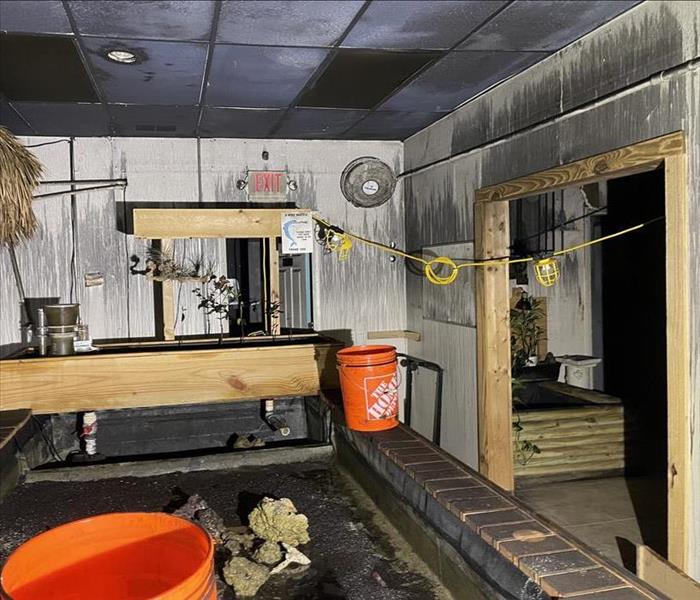 In this blog, we will explore essential best practices for preventing future fire damage in your home.
In this blog, we will explore essential best practices for preventing future fire damage in your home.
Preventing fire damage is crucial for the safety and well-being of your home and family. While fire damage restoration experts like SERVPRO® can help restore your property after a fire incident, implementing best practices for fire prevention is the most effective way to protect your home. In this blog, we will explore essential best practices for preventing future fire damage in your home. By following these practices, you can minimize the risk of fire, safeguard your property, and avoid the need for extensive fire damage restoration and remediation efforts.
Install Smoke Alarms
Equipping your home with working smoke alarms is essential for early fire detection. Install smoke alarms on every level of your home, including inside bedrooms and outside sleeping areas. Regularly test and replace the batteries in these alarms to ensure they are functioning correctly. Smoke alarms can provide vital early warning signals that can save lives and minimize property damage in the event of a fire.
Practice Safe Cooking Habits
Cooking-related fires are a common cause of residential fires. To prevent fire damage in the kitchen, maintain safe cooking habits such as:
- Never leave cooking unattended, especially when using stovetops or ovens.
- Keep flammable materials, such as kitchen towels, away from open flames.
- Clean cooking surfaces regularly to remove built-up grease and prevent grease fires.
- Have a fire extinguisher readily available in the kitchen and know how to use it properly.
Exercise Caution with Heating Systems
Heating systems, such as fireplaces, wood-burning stoves, and space heaters, require careful use to prevent fire damage. Follow these guidelines:
- Keep flammable materials at least three feet away from heating equipment.
- Use sturdy screens to prevent embers from escaping fireplaces.
- Properly maintain and clean chimneys and flues for efficient and safe operation.
- Turn off space heaters before leaving the room or going to bed.
Handle Electrical Appliances and Cords Safely
Electrical malfunctions and improper handling of appliances can lead to devastating fires. To prevent fire damage related to electrical issues, practice these precautions:
- Do not overload electrical outlets or extension cords.
- Replace frayed or damaged cords and wires promptly.
- Unplug appliances when not in use or when you leave the house.
- Use surge protectors to safeguard sensitive electronics.
Be Mindful of Candle Usage
Candles can create a cozy atmosphere, but they pose a fire risk if not used safely. Consider these precautions when using candles:
- Never leave candles unattended or within reach of children or pets.
- Place candles in sturdy holders on stable surfaces away from flammable materials.
- Blow out candles before leaving a room or going to sleep.
Develop a Fire Escape Plan
Having a well-thought-out fire escape plan is essential for every household. Create a plan that includes multiple escape routes, a designated meeting point outside the home, and the practice of regular fire drills. Ensure that all family members are familiar with the plan and know how to exit the home safely in case of a fire.
Keep Fire Safety Equipment Accessible
To prevent fire damage, it is vital to have the necessary fire safety equipment readily available. Maintain functional fire extinguishers on each level of your home, especially in high-risk areas like the kitchen, garage, and workshop. Additionally, ensure that fire extinguishers are easily accessible and regularly checked for proper functionality.
Preventing future fire damage in your home requires proactive measures and adherence to best practices. By installing and maintaining smoke alarms, practicing safe cooking habits, exercising caution with heating systems, handling electrical appliances and cords safely, being mindful of candle usage, developing a fire escape plan, and keeping fire safety equipment accessible, you can significantly reduce the risk of fire incidents. While fire damage restoration experts like SERVPRO are prepared to assist in the aftermath of a fire, prevention remains the most effective approach to protect your home and loved ones. Adopt these best practices for fire prevention, and enjoy the peace of mind that comes with knowing you have taken proactive steps to safeguard your home from the devastating effects of fire.
Black Mold: Myths vs. Facts
3/13/2024 (Permalink)
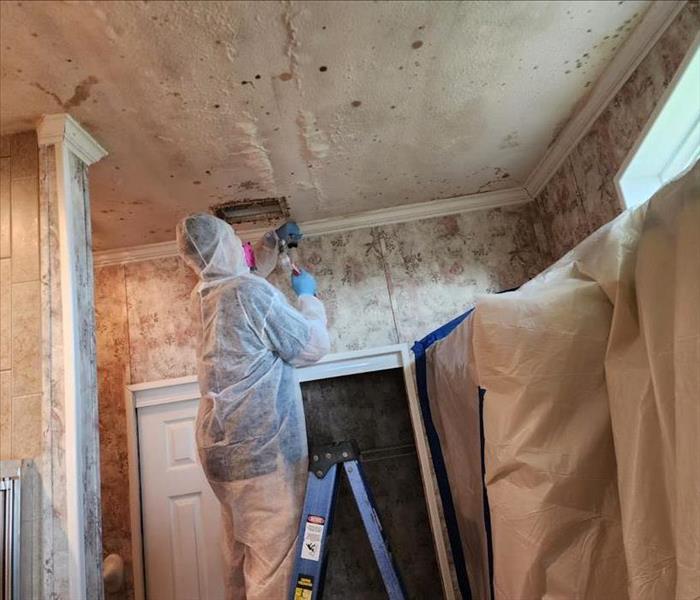 In this blog, we will explore common myths surrounding black mold and provide factual information to dispel any misconceptions.
In this blog, we will explore common myths surrounding black mold and provide factual information to dispel any misconceptions.
Black mold, also known as Stachybotrys chartarum, is a type of mold that has gained attention and generated various myths over the years. It is important to separate fact from fiction when it comes to this form of mold. In this blog, we will explore common myths surrounding black mold and provide factual information to dispel any misconceptions.
Myth 1: All Black Mold is Toxic
Not all black molds are inherently toxic. The term "black mold" is often used to refer to Stachybotrys chartarum specifically. While this particular mold can produce mycotoxins, it is essential to recognize that not all black molds are toxic. The color alone is not an indicator of toxicity. Professional assessment and testing can help determine the species and potential risks associated with mold in your home.
Myth 2: Black Mold is Always Visible
Black mold can certainly be visible on surfaces, presenting as a dark black or greenish-black growth. However, it can also grow in hidden areas, such as behind walls, inside ductwork, or under carpets. Just because you do not see black mold, it does not mean you are immune from its presence and potential damage. Musty odors or unexplained health symptoms may indicate hidden mold growth.
Myth 3: Bleach Can Effectively Eliminate Black Mold
While bleach can help remove mold stains on non-porous surfaces, it is not an effective solution for eliminating black mold entirely. Bleach is mostly water, and when applied to porous materials like drywall or wood, it can actually promote mold growth by providing moisture. Moreover, bleach cannot penetrate deeply into materials, making it ineffective in addressing hidden or deeply rooted mold growth. Professional mold restoration services are recommended for effective black mold removal and remediation.
Myth 4: You Can Remove Black Mold Yourself
Small mold outbreaks on non-porous surfaces may be safely addressed by homeowners with appropriate protective gear and cleaning agents. However, black mold remediation is a complex process that may require professional assistance. Trained professionals have the expertise, experience, and specialized equipment to handle black mold effectively. They can thoroughly assess the situation, contain the affected area, safely remove mold, and address the underlying causes to prevent further growth.
Myth 5: Once Black Mold is Removed, It Will Not Return
Completely eliminating black mold requires more than just removing visible growth. It is crucial to address the underlying source of moisture to prevent its return. Without identifying and rectifying the moisture problem, black mold is likely to resurface. Professionals specializing in mold restoration services can not only remove black mold but also implement preventive measures to minimize the risk of its recurrence.
Separating myths from facts about black mold is essential for homeowners dealing with mold damage. Understanding the misconceptions surrounding black mold can help you make informed decisions and take appropriate actions to safeguard your home. While black mold can be a serious issue, it is important to consult with professionals like SERVPRO® who offer specialized mold restoration services. Their expertise and proven solutions ensure that black mold is effectively eliminated, and preventive measures are implemented to restore and protect your home.
5 Tips to Master Water Extraction
1/24/2024 (Permalink)
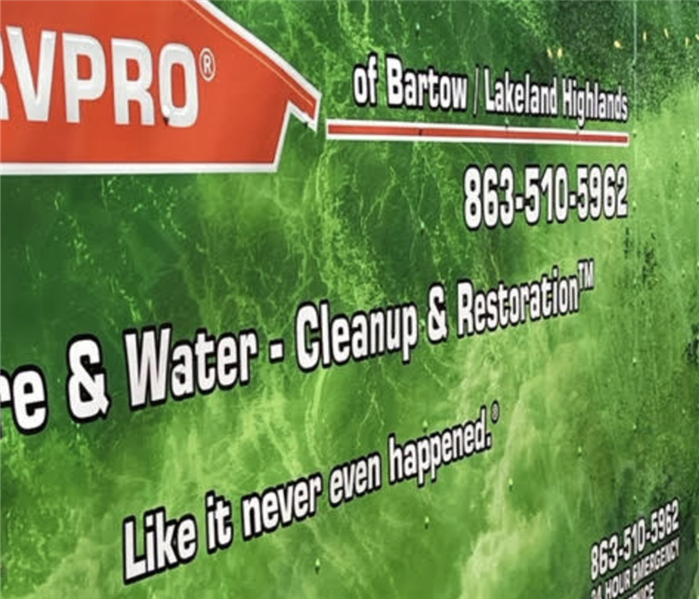 By partnering with our SERVPRO® team, homeowners and businesses can minimize damage and facilitate a faster restoration process!
By partnering with our SERVPRO® team, homeowners and businesses can minimize damage and facilitate a faster restoration process!
Water damage incidents can be overwhelming. To mitigate potential harm to properties, quick and effective water extraction is needed. At SERVPRO®, we've compiled five essential tips for successful water extraction that can assist homeowners and businesses in navigating water emergencies.
1. Act Quickly and Safely
Time is critical when addressing water damage. Act quickly to prevent further damage and other potential hazards. Prioritize safety by shutting off electrical sources and ensuring a safe environment before initiating any water extraction.
2. Assess the Situation
Before initiating water extraction, assess the extent and severity of the damage. Identify the water source and categorize the water damage (clean water, grey water, or black water) to determine the appropriate extraction and restoration methods.
3. Utilize Proper Equipment
Invest in or hire professional-grade equipment suitable for water extraction. Tools like pumps, wet vacuums, dehumidifiers, and air movers are essential for efficient water removal and drying processes. Ensure proper training or professional assistance for using this equipment.
4. Begin Extraction and Drying Immediately
Commence water extraction as soon as possible to prevent further damage and mold growth. Remove standing water using pumps or wet vacuums, and employ dehumidifiers and air movers to facilitate quick drying. Focus on thorough extraction to prevent lingering moisture.
5. Seek Professional Assistance
For extensive or severe water damage situations, seek professional help from restoration experts like SERVPRO of Bartow/Lakeland Highlands. Trained professionals possess the expertise, equipment, and experience necessary for comprehensive water extraction and restoration, ensuring thorough cleanup and minimizing future issues.
Why Trust SERVPRO® for Water Extraction?
- Swift Response: Our 24/7 emergency service ensures immediate response to mitigate water damage, utilizing advanced equipment for efficient extraction and restoration.
- Expertise and Efficiency: With extensive experience in water damage restoration, our professionals deliver effective solutions, ensuring thorough extraction and preventing further damage.
- Comprehensive Restoration: We offer complete restoration services, not just extraction, ensuring properties are restored to their pre-damaged state efficiently.
Successful water extraction is crucial in mitigating the impact of water damage. By following these tips and partnering with professionals like our SERVPRO® team, homeowners and businesses can navigate water extraction effectively, minimizing damage and facilitating a faster restoration process!
5 Common Damages You Can Expect After a Storm
1/8/2024 (Permalink)
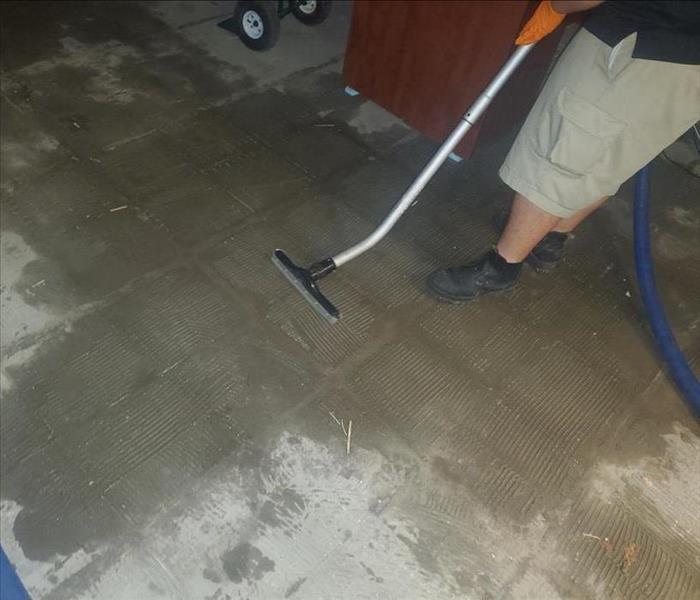 Understanding the most common storm damage repairs is crucial for homeowners to quickly address issues and prevent further damage.
Understanding the most common storm damage repairs is crucial for homeowners to quickly address issues and prevent further damage.
Storms can leave behind a trail of destruction, causing various types of damage to homes and properties. Understanding the most common storm-related repairs is crucial for prompt restoration and maintaining the structural integrity of your property. Below is a list of the top five common storm damage repairs you need to know about.
Roof Repair and Replacement
Roofs often bear the brunt of storm damage, experiencing leaks, missing shingles, or structural issues due to high winds and heavy rains. Promptly addressing roof damage is essential to prevent further water infiltration and structural deterioration. Professional inspection and repairs, including shingle replacement or complete roof restoration, are crucial for protecting your home from further damage.
Water Damage Restoration
Flooding, whether from heavy rains or burst pipes due to freezing temperatures, can cause extensive water damage to homes. Water infiltration can lead to weakened structures, mold growth, and damage to belongings. Professional water damage restoration services are essential to extract water, dry affected areas, and mitigate further damage to prevent long-term issues.
Window and Door Repairs
High winds and flying debris during storms can damage windows and doors, compromising the security and energy efficiency of your home. Repairing or replacing broken windows, damaged frames, or compromised door structures is crucial for maintaining safety and preventing further weather-related issues.
Siding and Exterior Repairs
Siding is susceptible to damage from hail, debris impact, or strong winds during storms. Damaged siding not only affects the aesthetic appeal of your home but also compromises its weatherproofing. Repairing or replacing damaged siding ensures proper insulation and protection against the elements.
Electrical System Restoration
Storms can cause power outages, electrical surges, or damage to electrical systems, posing fire hazards and risking the functionality of appliances and devices. Professional evaluation and repairs of electrical wiring, outlets, and appliances are necessary to restore safety and functionality.
Understanding the most common storm damage repairs is crucial for homeowners to quickly address issues and prevent further damage. At SERVPRO of Bartow/Lakeland Highlands, we specialize in storm damage restoration services, offering expertise and prompt assistance to restore your property to its pre-storm condition. Don't hesitate to seek professional help for efficient and effective storm damage repairs!
Top 5 Things That Should Be Replaced, Not Cleaned, After Fire Damage
12/16/2023 (Permalink)
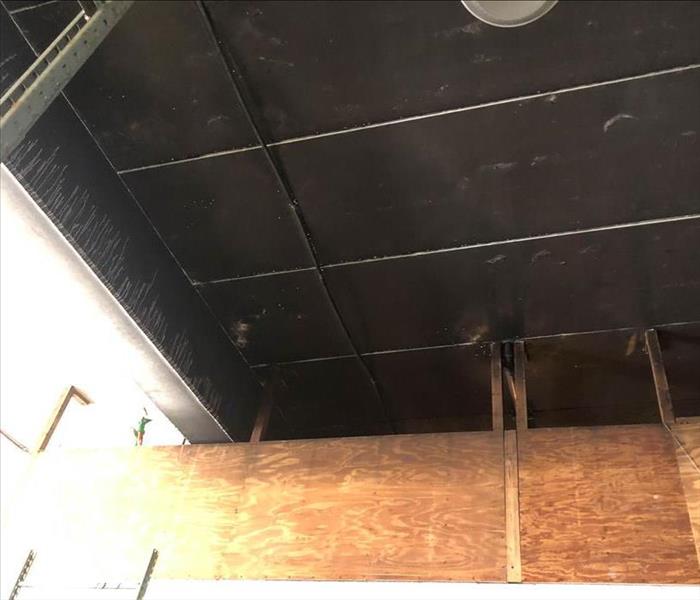 When faced with the aftermath of a fire, it's important to make informed decisions about what to clean and what to replace.
When faced with the aftermath of a fire, it's important to make informed decisions about what to clean and what to replace.
Fire damage can be devastating, leaving behind charred remnants and lingering odors. While it's essential to restore your property as quickly as possible, there are some items that are best replaced, rather than attempting to clean and salvage. In this blog, we'll discuss the top 5 things that should be replaced after fire damage, ensuring the safety, cleanliness, and efficiency of your home or business.
Insulation
Insulation is often one of the first things to consider replacing after a fire. Even if it doesn't appear damaged on the surface, it can absorb smoke and soot, which can release harmful particles into the air over time. Replacing insulation is crucial for maintaining indoor air quality and preventing health issues. Consult with a professional to determine the extent of the damage and the type of insulation that best suits your needs.
Drywall
Drywall is another item that is often better replaced than cleaned after a fire. Smoke and soot particles can penetrate the drywall, making it difficult to completely remove the odors and stains. Replacing affected drywall is a more effective way to eliminate the visual and olfactory reminders of the fire. Be sure to consult with a professional for proper removal and installation to ensure the job is done correctly.
Electrical Wiring and Components
Fire damage can weaken electrical systems and create a significant safety hazard. Damaged wiring and electrical components should be replaced to avoid the risk of electrical fires or other hazards. An electrician should inspect the system thoroughly to identify and replace damaged wiring, outlets, switches, and circuit breakers. This is crucial for the safety of your property and its occupants.
Carpet and Flooring
Carpets and flooring materials can trap smoke and soot particles, making them difficult to clean thoroughly. Even if they appear undamaged, the odors can linger, affecting indoor air quality. Replacing carpets and flooring is a more effective way to ensure a fresh and clean environment. Consider non-porous flooring options like tile or laminate for added durability and ease of maintenance.
HVAC Ductwork
Your HVAC (Heating, Ventilation, and Air Conditioning) system can spread smoke and soot throughout your property if not properly cleaned or replaced. After a fire, it's essential to have your HVAC ductwork inspected and cleaned by professionals. In some cases, replacing the ductwork might be the most effective solution to prevent the circulation of harmful particles throughout your home.
When faced with the aftermath of a fire, it's important to make informed decisions about what to clean and what to replace. Some items, like insulation, drywall, electrical components, carpet and flooring, and HVAC ductwork, are often better off being replaced to ensure the safety, hygiene, and efficiency of your property. It's crucial to consult with professionals to assess the extent of the damage and provide the best solutions for your specific situation. Rebuilding after a fire can be a challenging process, but with the right guidance, you can restore your property to its former glory and create a safe and welcoming environment once again.
The Impact Mold Has on Indoor Air Quality
11/14/2023 (Permalink)
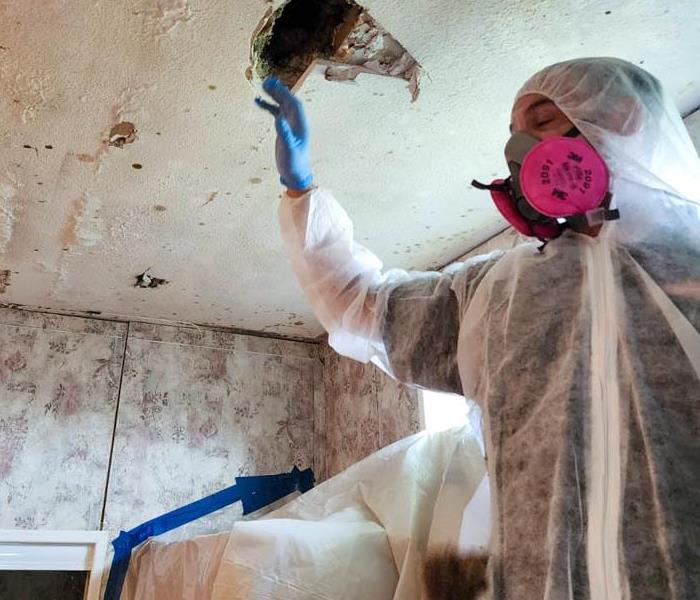 If you suspect mold in your home, it's crucial to have a professional mold inspection.
If you suspect mold in your home, it's crucial to have a professional mold inspection.
In Lakeland Highlands, a region known for its high humidity, the air you breathe at home plays a significant role in your overall well-being. One often underestimated factor affecting the quality of indoor air is the presence of mold. In this blog, we delve into the critical issue of mold and its profound impact on indoor air quality, shedding light on how it can affect your daily life and offering solutions for a better living environment.
Understanding Mold
Mold is a type of fungus that flourishes in damp, humid conditions. Lakeland Highlands' climate makes it highly susceptible to mold growth. Mold spores are everywhere, but when they find the right conditions, they can rapidly multiply, posing challenges to indoor air quality.
Impact on Indoor Air Quality
Mold contamination can result in significantly reduced indoor air quality. The presence of mold can make the air feel heavy and musty, impacting your overall comfort in your home. Mold emits a distinctive, unpleasant, and pervasive musty odor. This odor can linger in your living spaces, affecting your quality of life. Eliminating this odor often requires professional remediation to eradicate the source of the mold problem effectively.
Beyond its impact on air quality, mold can cause significant structural damage to your home. It thrives on porous materials like wood, drywall, and insulation. Over time, mold can weaken these materials, leading to expensive repairs and compromises in the structural integrity of your property.
Prevention and Remediation
Effective mold prevention hinges on managing moisture. Ensure your home is well-ventilated and free from water leaks. Regularly inspect and promptly address any areas where moisture can accumulate. Routinely cleaning and maintaining your home can also help prevent mold growth. Focus on high-humidity areas like bathrooms, kitchens, and basements. Reducing humidity and maintaining cleanliness are essential for minimizing mold's impact on indoor air quality.
If you suspect mold in your home, it's crucial to have a professional mold inspection. Experts can identify the extent of the issue and recommend appropriate remediation methods. SERVPRO® of Bartow/Lakeland Highlands is your local specialist for mold remediation and restoration, ensuring clean, mold-free living space.
Mold can significantly impact the air quality and the integrity of your home. Taking preventative measures, regular cleaning, and seeking professional help when needed are crucial steps in maintaining high indoor air quality. For any mold-related concerns in Lakeland Highlands, contact SERVPRO® for help!
Protecting Your Important Documents from Water Damage
10/9/2023 (Permalink)
Living in the beautiful state of Florida comes with its fair share of water-related risks, from heavy rains and flooding to the occasional hurricane. Protecting your important documents from potential water damage should be a priority for every Florida resident. In this blog, we'll explore practical steps you can take to safeguard your valuable documents and keep them safe and dry.
Identify and Prioritize Important Documents
Start by identifying which documents are crucial and need protection. These may include birth certificates, passports, Social Security cards, wills, insurance policies, property deeds, and financial records. Make a list of these documents to ensure nothing important is overlooked.
Utilize Waterproof Containers
Invest in waterproof containers or document bags designed to withstand water exposure. These containers are essential for protecting your documents from unexpected water disasters. Store your important papers in these containers to create a reliable barrier against water damage.
Create Digital Copies
In addition to physical copies, consider digitizing your important documents. Scan them and store them on a secure cloud service or an external hard drive kept in a waterproof container. This ensures that even if the physical documents are damaged, you have accessible digital backups.
Secure a Safe or Safety Deposit Box
For an extra layer of protection, consider storing your most critical documents in a home safe or a safety deposit box at your bank. These secure options can safeguard your valuables against both water and theft.
Regularly Update and Review Documents
As your life circumstances change, so do your important documents. Regularly update your documents and review them to ensure they reflect your current situation. This includes updating beneficiaries, addresses, and contact information.
Consult with a Professional Restoration Service
In the unfortunate event of water damage to your important documents, contact a professional restoration service like SERVPRO®. Our experts are trained to restore and recover water-damaged documents, photographs, and other valuable items.
Protecting your valuable documents from water damage in Florida is a proactive step toward safeguarding your future. By following these tips, you can ensure that your important papers remain safe, secure, and accessible, even in the face of unexpected water disasters. For expert assistance with water-damaged documents or property, reach out to SERVPRO®. We're here to help you through challenging times and restore what matters most.
Tips to Protect Your Electronics in Florida's Unpredictable Weather
9/17/2023 (Permalink)
Living in the sunshine state of Florida comes with its fair share of perks, but it also means being prepared for the occasional stormy weather that can sweep through the region. One aspect of storm preparedness that often goes overlooked is safeguarding your electronics. From lightning strikes to power surges, the elements can wreak havoc on your valuable gadgets. In this informative guide, we'll explore crucial strategies to ensure your electronics remain safe and sound during storms, allowing you to weather any tempest without worrying about your devices.
Unplugging is Your Best Friend
When a storm is on the horizon, make it a habit to unplug your electronics. Lightning strikes can send powerful surges through power lines, potentially damaging or even frying your devices. Disconnect your gadgets from power outlets and remove cables from surge protectors to eliminate the risk of electrical damage.
Surge Protectors: Your First Line of Defense
Invest in high-quality surge protectors to create a barrier between your electronics and power surges. These devices are designed to absorb excess electrical energy and prevent it from reaching your gadgets. Make sure to use surge protectors with enough outlets to accommodate all your valuable electronics.
Secure Properly Grounded Outlets
Ensure that your home's electrical outlets are properly grounded. Grounding helps dissipate excess electrical energy safely into the earth, reducing the risk of damage to your devices. If you're unsure about the grounding status of your outlets, consult a professional electrician for an assessment.
Elevated Storage
During a storm, it's wise to elevate your electronics off the ground. In case of flooding, this extra step can protect your devices from water damage. Consider placing your electronics on shelves, desks, or other elevated surfaces to keep them out of harm's way.
Sealable Plastic Bags
For extra protection against potential water damage, store smaller electronics such as smartphones, tablets, and remote controls in sealable plastic bags. This simple solution can help shield your devices from moisture if your home experiences leaks or flooding during a storm.
Back-Up and Protect Data
Your electronics are replaceable, but the data they hold may not be. Regularly back up your important files, photos, and documents to a secure cloud service or an external hard drive. In the event of a disaster, you'll have peace of mind knowing your data is safe and retrievable.
Stay Informed
Stay informed about impending storms and weather conditions by utilizing weather apps and alerts. Being aware of when a storm is likely to hit gives you the opportunity to take necessary precautions and protect your electronics in advance.
In the dynamic weather environment of Florida, protecting your electronics during storms is a crucial aspect of overall storm preparedness. By following these proactive steps, you can ensure that your valuable gadgets remain unscathed and functional even in the face of the most challenging weather. From unplugging devices and using surge protectors to elevating storage and investing in uninterruptible power supplies, these measures will empower you to safeguard your electronics and maintain peace of mind no matter how fierce the storm may be.
Rebuilding after Disaster: Essential Steps for Commercial Fire Cleanup
9/12/2023 (Permalink)
A fire can cause significant damage to a property, leaving behind a trail of destruction. After a fire, the cleanup and restoration process is essential to ensure that the property is safe to occupy and return to normal life. One of the critical considerations during this process is determining what can be salvaged and what should be thrown away. In this blog post, we will discuss some of the items that should be thrown away after a fire.
Food and Beverages
Food and beverages that have been exposed to extreme heat or contamination from smoke and ash should be thrown away. This includes both perishable and non-perishable food items. Even if the packaging appears to be intact, there's a risk of contamination with harmful chemicals and bacteria that can harm your health. It's best to err on the side of caution and dispose of all food items that have been exposed to the fire or smoke.
Medicines and Cosmetics
Medicines and cosmetics can also be affected by heat, smoke, and moisture during a fire. Any medication showing signs of heat or smoke damage should be immediately discarded. The same goes for any cosmetics exposed to high temperatures, smoke, and ash as they may contain harmful chemicals that can result in skin irritation and other health issues.
Soft Furniture and Textiles
Soft furnishings such as couches, mattresses, pillows, and curtains are particularly vulnerable to smoke, ash, and moisture. Even if they appear sound, it's often best to dispose of these items following a fire. Smoke and ash particles can stick to the fabric, and moisture can lead to mold and mildew growth, which can lead to unpleasant smells and health problems in the future.
Electronics and Appliances
Electronic devices and appliances can sustain damage from both the fire itself, as well as the heat and water used to extinguish it. Even if the electronics appear to be functioning normally, they may have sustained internal damage that could cause hazards or cause them to malfunction later. To be safe, it’s best to have an experienced technician check the electronic devices and appliances for damage and determine if it’s repairable or if they should be replaced.
Building Materials
Lastly, some structural and building materials may not be suitable for reuse following a fire. Materials like drywall, insulation, and flooring can absorb smoke and hazardous chemicals, which can lead to long-term health problems. Professionals can evaluate the extent of damage and determine what needs to be thrown away and what can be salvaged.
After a fire, deciding what to keep and what to throw away can be a difficult decision. But, it’s best to prioritize safety and health over sentimental values. It's essential to seek the services of a professional fire damage restoration company who can determine what needs to be discarded and what can be salvaged. Remember, cleaning up after a fire can be a hazardous and complicated task, and you may risk further damages if you attempt to do it on your own. By contacting professionals and trusting their expertise, you may have a safe and effective cleanup process.
Is Your Water Heater Making Noises? Understanding and Addressing Common Causes
7/17/2023 (Permalink)
Your water heater is an essential appliance that provides hot water for various household tasks. While it generally operates quietly in the background, you may occasionally notice unusual noises coming from your water heater. These sounds can be concerning and may indicate underlying issues that require attention. In this blog post, we will explore the common causes of water heater noises, their potential implications, and the steps you can take to address them effectively.
Sediment Buildup
One of the primary reasons for water heater noises is sediment buildup. Over time, minerals and debris can accumulate at the bottom of the tank, creating a layer of sediment. When the burner or heating element heats the water, it bubbles through the sediment, resulting in popping or rumbling sounds. Regular maintenance, such as flushing the tank to remove sediment, can help alleviate this issue.
Expansion and Contraction
As water heats up, it expands and causes the tank to expand and contract. This expansion and contraction process can produce cracking or popping sounds, especially if the water heater is inadequately secured or the temperature is set too high. Ensuring proper installation and adjusting the temperature settings within the recommended range can help minimize these noises.
Thermal Expansion
In closed plumbing systems, thermal expansion occurs when heated water expands and increases pressure within the pipes. This can lead to a banging or knocking noise, known as water hammer. Installing an expansion tank or pressure-reducing valve can help mitigate the effects of thermal expansion and reduce associated noises.
Faulty Heating Element or Burner
A malfunctioning heating element or burner can cause popping, sizzling, or hissing sounds. This could be due to a faulty component or an accumulation of sediment or mineral deposits on the heating element or burner. In such cases, it is advisable to have a professional plumber inspect and repair the water heater to ensure its proper functioning.
Loose or Damaged Components
Loose or damaged components within the water heater, such as valves, pipes, or heating elements, can create rattling, banging, or clanking noises. Tightening loose connections or replacing damaged parts can help eliminate these sounds and prevent further issues.
If your water heater is making unusual noises, it's important not to ignore them. By understanding the common causes of water heater noises and taking appropriate action, you can address the underlying issues and prevent potential damage or system failure. Regular maintenance, including flushing the tank, adjusting temperature settings, and seeking professional assistance when needed, can help ensure the efficient and quiet operation of your water heater. Remember, if you are unsure about the cause or unable to resolve the issue yourself, it is always advisable to consult a qualified plumber to diagnose and address the problem effectively.


 24/7 Emergency Service
24/7 Emergency Service




